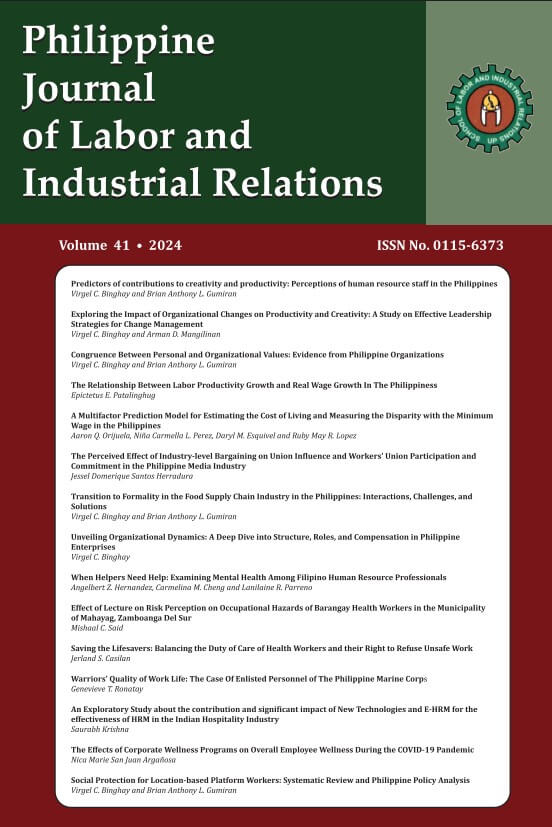Warriors’ Quality of Work Life: The Case of Enlisted Personnel of the Philippine Marine Corps
Abstract
This case study aims to assess the quality of life at work of enlisted personnel (EP) of the Philippine Marine Corps. It specifically looks at the various
challenges/issues/problems that affect the mental and physical condition of EPs; their coping mechanisms; the programs in place and their effectiveness in ensuring their quality of work life. Using convenient and non-random sampling, a survey was conducted to the EPs where much attention was given to their insights on work-related issues, current morale and welfare programs of the PMC, personal family life, and actual experiences in the field. Interviews with key informants were likewise carried out to further corroborate the findings on their quality of life at work.
The three primary stressors experienced by EPs are all related to the preservation of life and the risk brought by their deployment in the combat
zone. These were closely followed by their inadequate sustenance in the field and uncertainty of coming home alive. The findings revealed the presence of a high work-related stress among the EPs which affects their physical and mental well-being. Anxiety and depression are experienced particularly during operational assignments. This extends to their immediate families who share in the stress due to the spill-over of any outward symptom that may be manifested by the EP. Being unable to strike a balance between work and family results in unavoidable conflict within the family. This situation is made more difficult due to internal factors such as the limited time to avail Rest and Recreation (R & R) and the geographical location of assignments. These are strong indicators that the quality of work life of the EPs is far from ideal.
In order to somehow experience a better quality of work life, the EPs engage in various strategies such as praying, physical training/sports, listening to music, drinking alcohol, womanizing, communicating with family regularly, and self-gratification among others.
Hence, intervention programs are very much needed since the preservation of life is uncertain in the armed profession. It is recommended to a) Implement better human resources management to enhance the capabilities of its personnel; b) Review the performance of the officers or unit leaders to determine if they have the right knowledge, skills, and attitude to effectively and efficiently carry out the tasks; c) Revisit the career development program of the Philippine Marine Corps (PMC) for all enlisted personnel; d) Adopt the best practices of military organizations of other countries such as their health and wellness programs; and e) Employ artificial intelligence or heavily invest in mechanized weapons. Lastly, additional research may be done to address common challenges and establish mutually reinforcing programs beneficial not only to the EPs but also to the whole organization. After all, a distressed soldier may become a liability and may put the whole troop in jeopardy.


